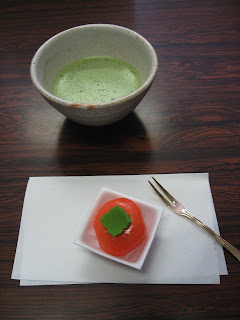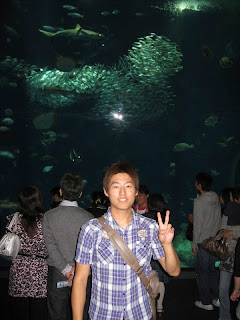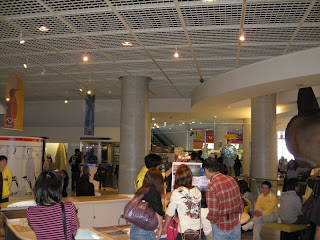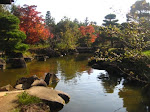
Ikebana

2 Hot dogs with masks to protect themselves from Influenza

Hip hop performance

Chinese club making and cooking gyoza

The Tokiwa College School Festival was held this weekend. On the same Saturday, the English Speech Contest for high school students was held at Tokiwa. We had the opportunity to watch 14 high school students make 5 min. English speeches, each which they made and memorized. I could not imagine doing the same thing in Japanese...these kids really are amazing. Anyways, afterwords, we conversed with the kids. In America, before we left for Japan, we were told that everyone in Japan was short. Sorry to leave you disappointed, but Japan is just like America, with short and tall people. Akira, the high school on student on the left, and Zaren, the exchange student on the right, are around 184 cm, and Chihiro, the high school girl on the bottom left, and I, on the bottom right, are around 149 cm.
The Tokiwa School Festival was packed and exciting!
Everyone in the school had been insanely busy during the weeks leading up to the festival. The Chinese circle practiced cooking gyoza, making the wrapping and filling by hand; the Saado circle prepared for their tea ceremony, including the room with the tatami mats and their kimonos; the different hip-hop dance teams practiced their dances and set up the cafeteria with a stage and stage lighting; the ikebana circle created beautiful flower arrangements; and many other clubs worked with all their might to set up their venues, perfect their speeches, acts, and performances, and to create popular snacks and foods to raise funds for their club, such as crepes, parfaits, chocolate bananas, yakisoba, yakiudon, yakitori, takoyaki, etc. There were also very many people dressed in costumes (even though it is not quite Halloween yet). Halloween is not really celebrated here in Japan, but it seems that many students use the Tokiwa Festival as a day to dress in costume (but that could be due to the Cosplay Contest).
It was lots of fun, despite the crowds.
Till next time,
Germaine










 The structure of the aquarium reminded me of a mall. While Sea World in San Diego is wide and requires much walking outside amongst the different venues, the Oarai aquarium was one entire building and visiting the different attractions required much stair-climbing. At the highest floor of the aquarium, after observing all the fish, I ate sashimi in the food court while observing people surfing at the beach below us.
The structure of the aquarium reminded me of a mall. While Sea World in San Diego is wide and requires much walking outside amongst the different venues, the Oarai aquarium was one entire building and visiting the different attractions required much stair-climbing. At the highest floor of the aquarium, after observing all the fish, I ate sashimi in the food court while observing people surfing at the beach below us. 